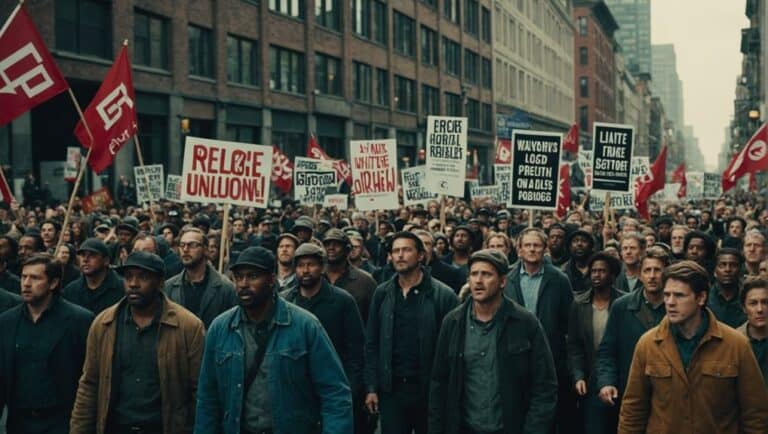Discover how labor unions rose fiercely during the Industrial Revolution. They battled through strikes and government repression to secure fair wages and safer working conditions.
Uncover the relentless efforts and economic radicalism that shaped today's labor policies and worker cooperatives.
Origins of the Labour Movement
The labour movement's roots can be traced back to the Industrial Revolution, a period when the shift from agrarian economies to industrialized societies necessitated collective efforts to improve workers' rights and conditions. During this transformative era, workers faced grueling hours, unsafe working environments, and minimal wages. This dire situation catalyzed the need for labor unions as a means of advocating for worker rights and better conditions.
Initially, workers had little to no leverage against powerful industrialists. However, the concept of collective bargaining began to take shape, allowing workers to negotiate as a unified entity. This collective power was essential in demanding fair wages, reasonable working hours, and safer work conditions. The Industrial Revolution highlighted the stark divide between laborers and their employers, making it clear that individual efforts were insufficient to bring about meaningful change.
The foundational aspects of the labor movement were also influenced by earlier practices, such as the European guild system, which governed wages and business practices before industrialization. These early forms of organized labor set the stage for the more formalized unions that would emerge.
Ultimately, the origins of the labor movement during the Industrial Revolution underscored the necessity of unity and collective action in the fight for worker rights.
Early Trade Unions in Britain
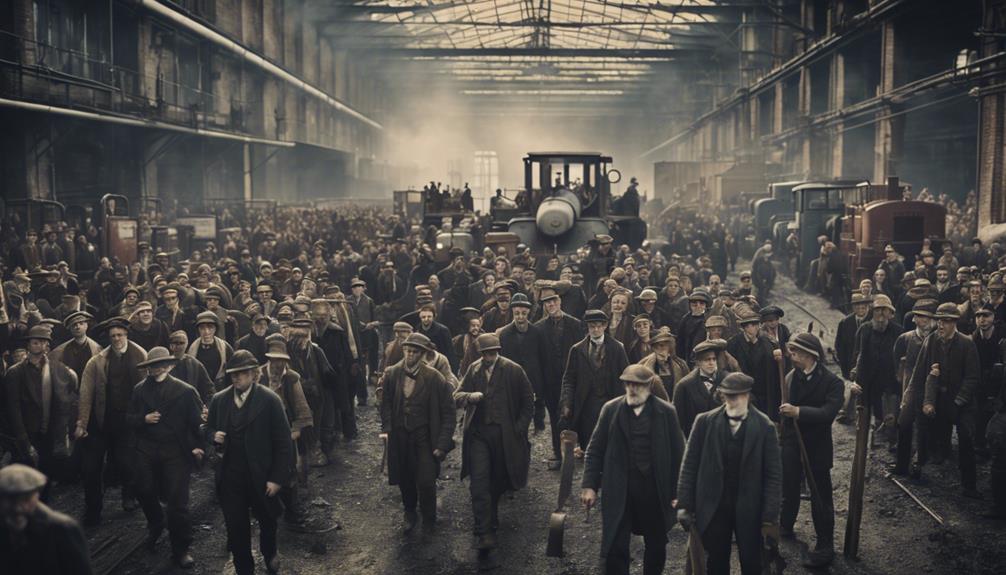
In 18th-century Britain, trade unions began to form as workers sought to improve their wages and working conditions through collective action. Early trade unions, though small, played a pivotal role in advocating for workers' rights. These groups organized strikes and engaged in collective bargaining, pushing for better wages and safer working environments. They also sought parliamentary support to legitimize their cause and protect their interests.
Workers in various trades, including weavers, printers, and miners, recognized the power of unity. They realized that organized labor could challenge exploitative practices and negotiate more favorable terms with employers. These early unions faced significant challenges, including legal restrictions. The Combination Acts of 1799 aimed to suppress these movements by outlawing unions, but instead of diminishing, organized labor grew stronger.
The economic downturn following the Napoleonic Wars further fueled the rise of pro-labor politics. Workers established political clubs and working-class papers, creating a platform to voice their demands and garner wider public support. This period marked the beginning of a more structured labor movement, setting the stage for future advancements in workers' rights and laying the groundwork for the eventual success of trade unions in Britain.
Government Repression and Resistance

Government repression against labor unions intensified as authorities sought to squelch the burgeoning pro-labor politics that threatened the established order. The British government, under Pitt the Younger, spearheaded efforts to curtail workers' rights by enacting the Combination Acts of 1799, which made unions illegal. This period saw authorities outlawing societies, restricting speech, and implementing stringent policies to stifle labor movements.
As the Napoleonic Wars ended, labor resistance grew more pronounced. Workers, burdened by economic hardship, demanded tax reductions and an end to war debt payments. The repression they faced only fueled their resolve, leading to widespread radicalism. Riots and protests became common as laborers fought against oppressive policies and demanded fair treatment.
Government crackdowns were severe. Authorities responded to labor resistance with arrests, trials, and harsh punishments, aiming to dismantle the growing union influence. Yet, these measures often backfired, galvanizing workers further.
The push for rights didn't wane; it intensified, laying the groundwork for future labor movements.
Impact of Labour Radicalism
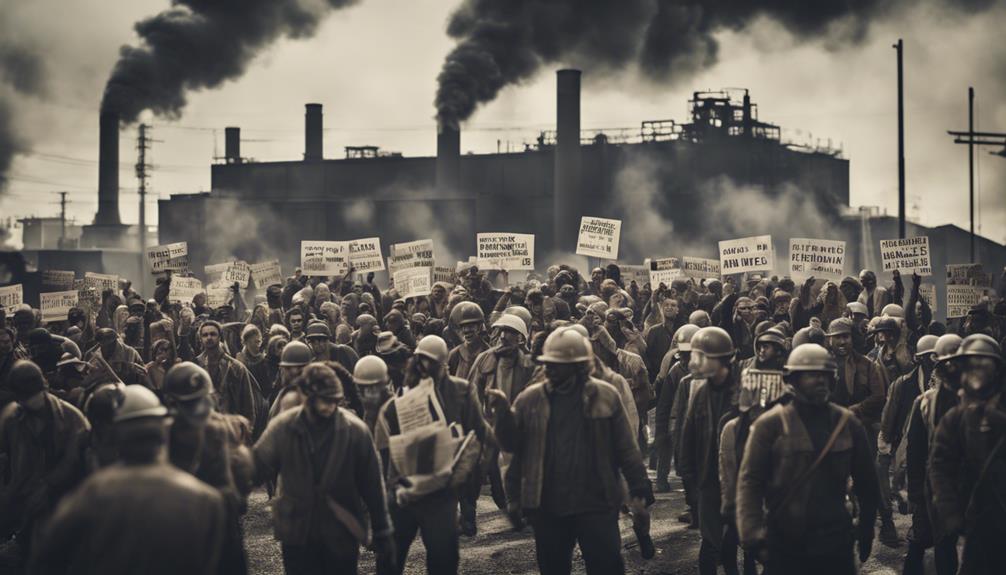
You can see the profound impact of labor radicalism through the tireless advocacy of leaders like John Wilkes and groups such as the London Corresponding Society, who championed voting and popular rights.
Government repression under Pitt the Younger, including restrictions on speech and the outlawing of unions, only heightened the urgency for change.
Amidst economic hardships and high food prices, these radical efforts galvanized the working class, leading to significant events like the Spa Fields riots and the formation of political clubs and working-class papers.
Radical Leaders' Advocacy
Radical leaders like John Wilkes and groups such as the London Corresponding Society played a pivotal role in championing voting rights and advocating for popular rights, setting the stage for a transformative era in the labour movement. These leaders and organizations didn't just demand change—they actively shaped the narrative around workers' rights. By pushing for broader voting rights, they aimed to give the working class a voice in government decisions, challenging the status quo that kept power concentrated in the hands of a few.
Their advocacy for popular rights extended beyond the ballot box, calling for reforms that would improve everyday living conditions for workers. However, their efforts were met with significant government repression. Under Pitt the Younger, the government sought to stifle these movements by restricting speech, outlawing societies, and making unions illegal. This repression only fueled the determination of these radical leaders, who recognized that economic hardships and high food prices were significant drivers of unrest.
In this context, the labour movement's growth was inevitable. Radicalism's influence post-Napoleonic Wars led to the formation of working-class papers and political clubs, further embedding pro-labour politics into the societal fabric. These efforts laid the groundwork for future reforms and the eventual empowerment of the working class.
Government Repression Tactics
As radical leaders like John Wilkes and advocacy groups fought for workers' rights, Pitt the Younger's government swiftly countered with a series of draconian measures aimed at quelling the burgeoning labour movement.
You can see how the government repression tactics were designed to suppress labour radicalism through various means. Restrictions on speech were imposed to silence dissenting voices. Public gatherings, which were essential for mobilizing support, were also severely curtailed.
The government didn't stop there; they went further by outlawing societies that championed workers' rights, effectively criminalizing the very existence of these advocacy groups. The London Corresponding Society, a key player in the movement, was among those targeted. This move aimed at restricting freedoms, ensuring that such organizations couldn't function openly or effectively.
Riots and crackdowns became commonplace as economic hardships and high food prices fueled labour radicalism. These government crackdowns often involved violent suppression of protests, further stifling the movement.
Economic Hardship Effects
The economic hardships following the Napoleonic Wars ignited a fervent wave of labour radicalism that fundamentally reshaped pro-labour politics in Britain. High food prices and widespread economic inequality exacerbated the struggles of the working class, pushing them toward radical measures. This period saw significant developments:
- Labor Strikes and Protests: Workers organized strikes to demand better wages and working conditions.
- Formation of Political Clubs: Radicals created clubs and working-class papers to advocate for labor reform.
- Safety Regulations and Wage Negotiations: These became key issues as workers sought protection from exploitation.
You saw radical leaders, like John Wilkes, pushing for voting rights amidst intense government repression. The demand for tax reductions and an end to war debt payments reflected a broader discontent with economic policies that favored the elite. Riots, such as the Spa Fields riots, highlighted the desperation and determination of the working class.
These actions led to significant changes in labor reform, including the establishment of safety regulations and structured wage negotiations. Labor strikes became a powerful tool against worker exploitation, gradually reducing economic inequality. The radicalism of this era laid the groundwork for future labor movements and set a precedent for how economic hardship could galvanize societal change.
Global Influence of Labour Movements
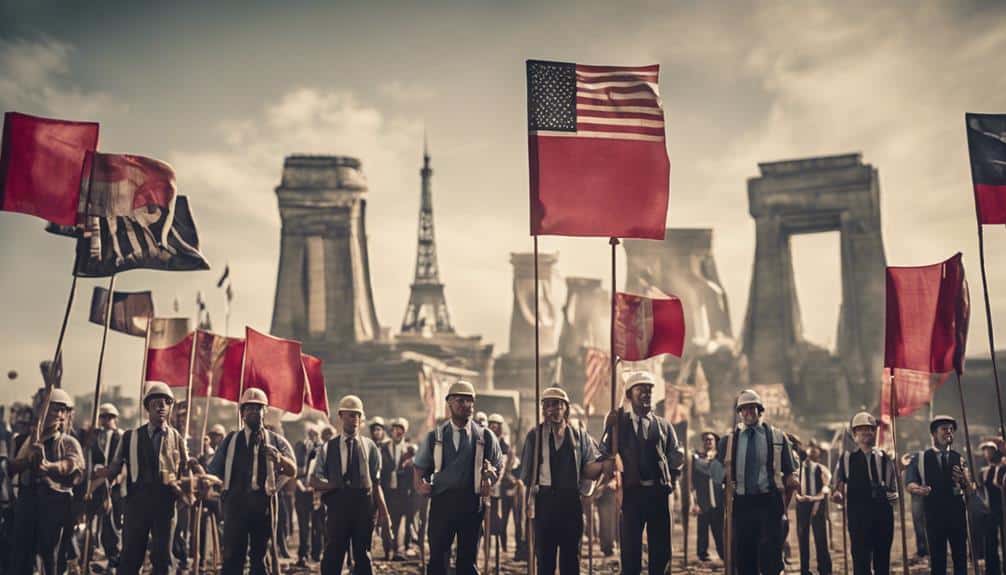
Since its inception in the 19th century, the labour movement has profoundly shaped global standards and practices, driving significant social and economic reforms across continents. In the United States, labor unions have been pivotal in advocating for workers' rights. They've influenced federal laws that established minimum wage standards, ensuring a fair baseline for worker compensation.
This movement's global influence extends beyond just the U.S., as labour unions worldwide have fought for and achieved critical reforms. The International Workingmen's Association, founded in London in 1864, underscored the global nature of these efforts. Labour movements have universally championed policies like the two-day weekend and minimum wage laws, transforming how societies view labour rights.
Beyond legislation, the Catholic Social Teaching tradition has also pushed for global reforms, emphasizing the moral imperative to protect workers' rights. Modern labour parties, originating in 19th-century Europe, have now expanded globally, continuously advocating for enhanced social security and fair working conditions.
International efforts to organize and collectively bargain have standardized labour practices, ensuring a more equitable work environment worldwide. Through persistent advocacy, the global labour movement has set a precedent for just and humane working conditions, shaping a fairer world for all workers.
Cooperatives and Labour Culture
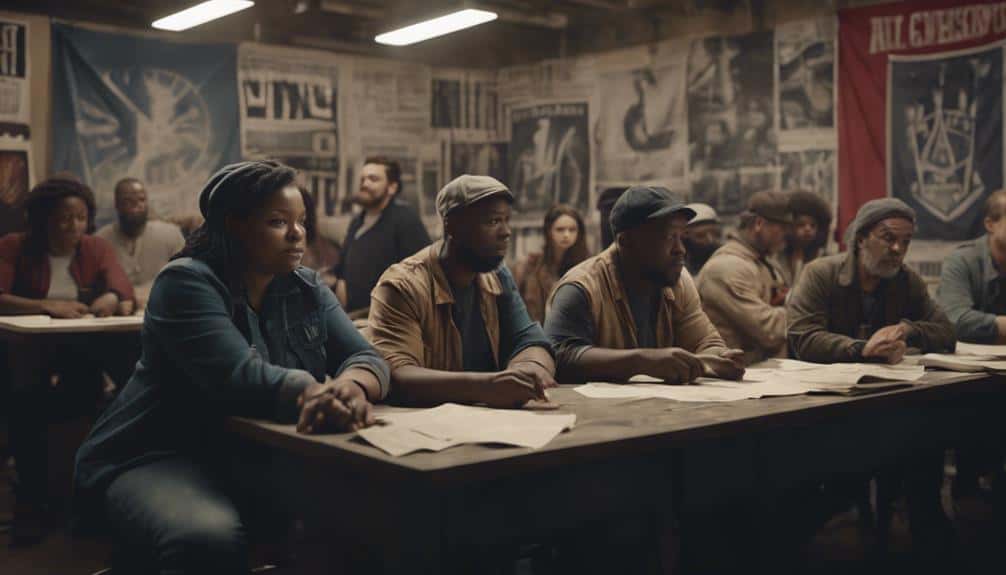
You'll find that worker cooperatives have played an essential role in the labour movement by promoting collective ownership and economic democracy.
Celebrating labour achievements through festivals fosters solidarity and highlights the values that drive the movement.
These cooperatives continue to advocate for worker empowerment, underscoring the ongoing relevance of economic democracy within the labour culture.
Role of Worker Cooperatives
Worker cooperatives stand as evidence of the power of collective ownership and democratic control, fundamentally reshaping labor culture and economic democracy. By promoting collective ownership, these cooperatives guarantee that workers have a direct stake in the company's success. Democratic control means every worker has a voice in decision-making, fostering a more inclusive work environment.
To understand the impact of worker cooperatives, consider:
- Economic Conditions: Worker cooperatives often emerge in response to economic challenges, providing stability and shared prosperity.
- Labor Festivals: These events celebrate cooperative values and achievements, reinforcing solidarity and community among workers.
- Economic Democracy: Cooperatives advocate for a system where economic power is distributed more equitably among all workers.
Historically, worker cooperatives have been a cornerstone in efforts to improve economic conditions for laborers. They offer an alternative to traditional hierarchical business models, promoting fairness and equity. Labor festivals play an essential role in this movement, highlighting the successes of cooperatives and encouraging wider adoption.
Celebrating Labor Achievements
Celebrating labor achievements through cooperatives and labor culture highlights the enduring power of collective action and the importance of shared victories in shaping a fairer economic landscape. Cooperatives have long been integral to the labor movement, as they promote collective ownership and democratic control, allowing workers to directly influence their economic conditions. When you look at union members' efforts, it's evident that these initiatives have helped protect workers and push for safer working conditions.
Labor festivals are another key aspect, offering a platform to celebrate achievements and foster solidarity among workers. These events not only recognize the hard-won improvements in better working conditions but also solidify the values of the labor movement. By participating in these celebrations, you can gain a deeper appreciation for the historical and cultural significance of labor rights struggles.
The cooperative movement, with its roots deeply embedded in worker empowerment, continues to champion economic democracy. This advocacy is vital for promoting a more equitable distribution of resources and opportunities. By understanding and celebrating these achievements, you contribute to a culture that values and aims for fairness and justice in the workplace.
Economic Democracy Advocacy
In examining the advocacy for economic democracy within the labor movement, it's essential to understand how cooperatives and labor culture have persistently worked to redistribute power and resources more equitably among workers. Cooperatives are fundamental to this effort, promoting collective ownership and democratic control. They guarantee that workers have a direct say in decision-making processes, which fosters a sense of worker empowerment.
The cooperative movement continually advocates for economic democracy, emphasizing that workers should benefit from and control the means of production. This approach helps to mitigate the inequalities prevalent in traditional capitalist structures. Here are three key aspects to consider:
- Collective Ownership: Workers collectively own the enterprise, guaranteeing profits and decision-making are shared equitably.
- Democratic Control: Each worker has a vote in the organization's decisions, promoting fairness and transparency.
- Worker Empowerment: By having control over their work environment and profits, workers gain increased motivation and satisfaction.
Labour festivals also play an important role by celebrating the achievements and values of the labor movement. These events foster solidarity and remind workers of the collective power they hold, reinforcing the principles of the cooperative movement and economic democracy.
Significant Strikes and Conflicts
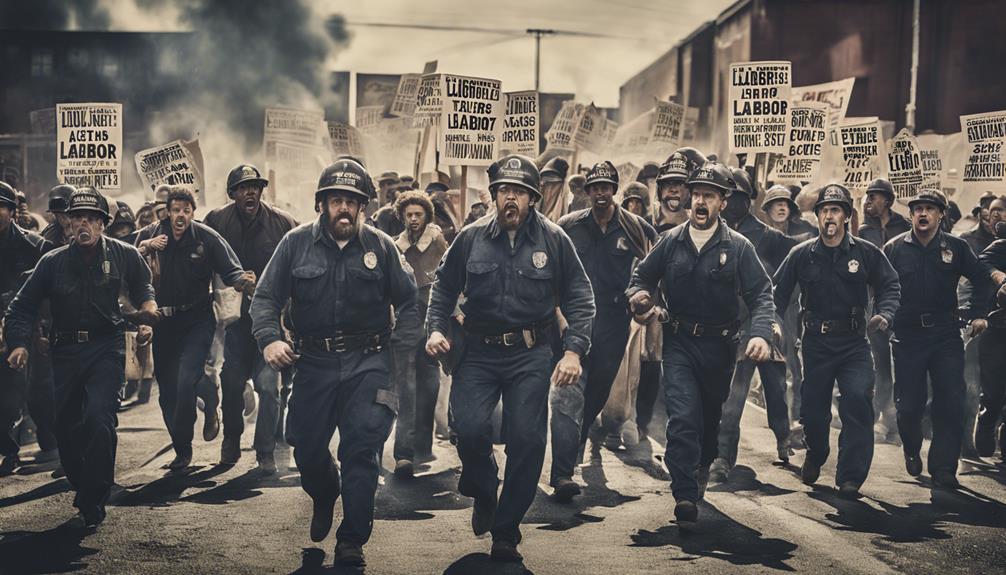
Through the lens of significant strikes and conflicts, you'll see how labor unions' fierce battles for workers' rights reshaped American industry and society. The Homestead Strike of 1892 stands out as a pivotal moment when skilled steelworkers clashed with industrial magnate Andrew Carnegie's forces at a Pennsylvania mill. This strike underscored the intense national struggle between labor unions and industrial giants, illustrating the high stakes of working conditions in the United States labor market.
The McKees Rock Strike further highlighted the vast challenges faced by immigrant laborers in early 20th-century America. Thousands of workers, inspired by leaders like Eugene V. Debs, fought for better wages and safer conditions, symbolizing a united front against exploitation.
Meanwhile, the Triangle Shirtwaist Fire in 1911 tragically exposed the dire need for workplace safety reforms, with 146 young women losing their lives, marking a somber chapter in labor history.
In Colorado's Cripple Creek, miners' dramatic conflicts with mine owners echoed the fierce determination of the Western Federation of Miners. Similarly, Atlanta's Washerwomen Strike in 1881 showcased the power of organized labor, as black laundresses demanded higher wages and respect, gaining community support and challenging social norms. These events collectively forged a path toward improved labor rights.
Government Intervention in Labour Disputes
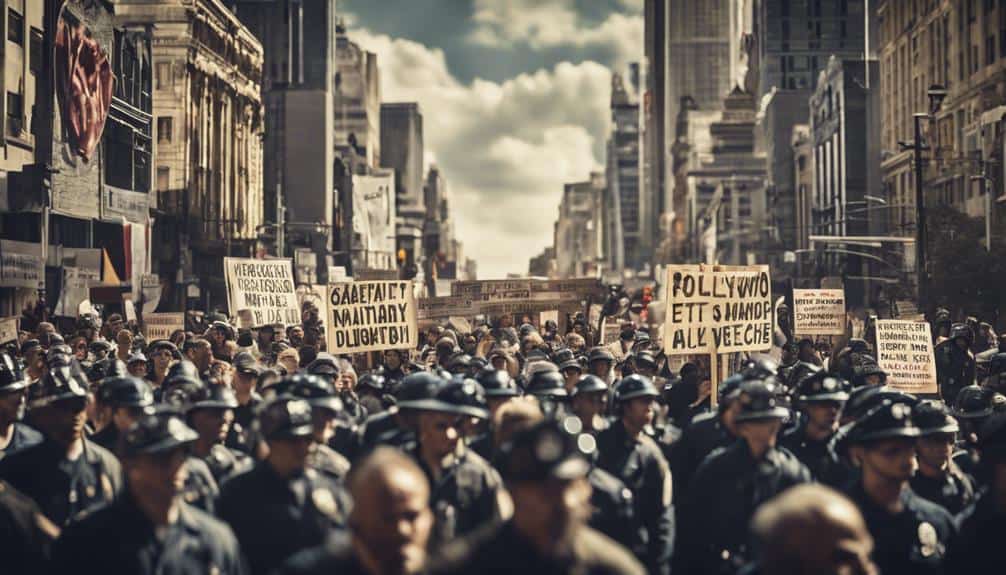
As labor unions waged fierce battles for workers' rights, the role of government intervention in labor disputes became increasingly prominent, shaping the landscape of American labor relations.
The Norris-LaGuardia Act of 1932 was a pivotal moment, protecting workers' rights to unionize and setting the stage for future government involvement. Government intervention often took the form of legislation, direct action, or mediation during high-stakes labor conflicts.
Consider these key interventions:
- Wagner Act (1935): Also known as the National Labor Relations Act, it established the National Labor Relations Board (NLRB) to protect workers' rights to organize and bargain collectively.
- Taft-Hartley Act (1947): This act restricted the activities and power of labor unions, illustrating a shift in government intervention towards balancing labor and business interests.
- Department of Labor's Role: The Department has been instrumental in mediating disputes and enforcing labor laws, especially during critical strikes like the Brookside Mine clash in 1974.
Government intervention wasn't always smooth. The Memorial Day Massacre and the Allis-Chalmers strike underscored how complex and sometimes violent these disputes could be.
Each intervention, whether through Labor and Congress or executive action, significantly impacted the trajectory of labor rights in America.


